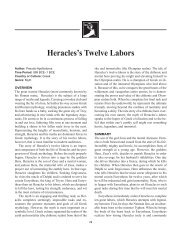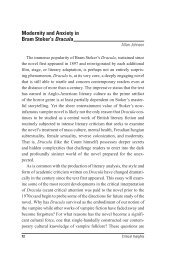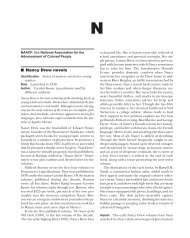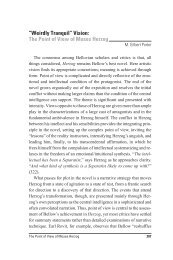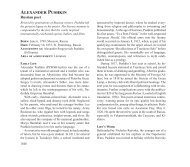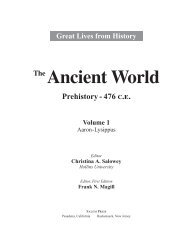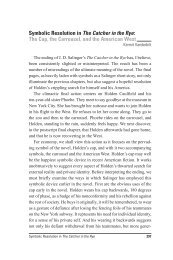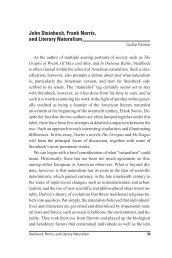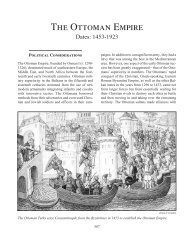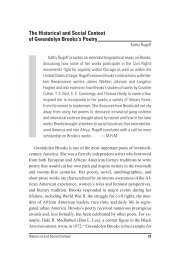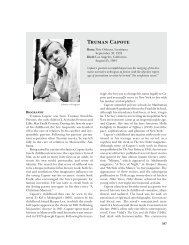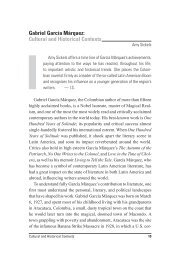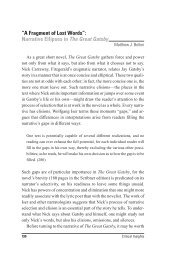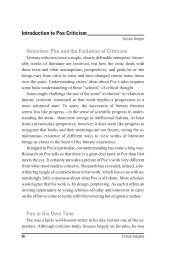Create successful ePaper yourself
Turn your PDF publications into a flip-book with our unique Google optimized e-Paper software.
Critical Survey of Poetry Neruda, Pablo<br />
Dusty glances fallen to earth<br />
or silent leaves which bury themselves.<br />
Lightless metal in the void<br />
and the suddenly dead day’s departure.<br />
On high hands the butterfly shines<br />
its flight’s light has no end.<br />
You kept the light’s wake of broken things<br />
which the abandoned sun in the afternoon throws at the<br />
church steps.<br />
Here, one can see Neruda’s gift for surreal imagery<br />
without the programmatic irrationality and dislocation<br />
of the Surrealists.<br />
In Residence on Earth, too, there are magnificent<br />
catalogs in the manner of Walt Whitman: “the angel of<br />
sleep—the wind moving the wheat, the whistle of a<br />
train, a warm place in a bed, the opaque sound of a<br />
shadow which falls like a ray of light into infinity, a repetition<br />
of distances, a wine of uncertain vintage, the<br />
dusty passage of lowing cows.”<br />
Like Whitman, Neruda in Residence on Earth opens<br />
Spanish poetry to the song of himself: “my symmetrical<br />
statue of twinned legs, rises to the stars each morning/<br />
my exile’s mouth bites meat and grapes/ my male arms<br />
and tattooed chest/ in which the hair penetrates like<br />
wire, my white face made for the sun’s depth.” He presents<br />
uncompromising statements of human sensuality;<br />
he descends into himself, discovers his authenticity, and<br />
begins to build a poetic vision that, although impure, is<br />
genuinely human. He manages in these sometimes brutal<br />
poems to reconcile the forces of destruction and creation<br />
that he had witnessed in India in the material world<br />
of buildings, work, people, food, weather, himself, and<br />
time.<br />
Although Neruda never achieved a systematic and<br />
internally consistent poetic vision, the balance between<br />
resignation and celebration that informs Residence on<br />
Earth suggests a philosophical acceptance of the world.<br />
“Tres cantos materiales” (“Three Material Songs”),<br />
“Entrada a la madera” (“Entrance to Wood”), “Apoges<br />
del apio” (“Apogee of Celery”), and “Estatuto del vino”<br />
(“Ordinance of Wine”) were a breakthrough in this respect.<br />
In “Entrance to Wood,” the poet gives voice to<br />
wood, which, though living, is material rather than spiritual.<br />
Neruda’s discovery of matter is a revelation. He introduces<br />
himself into this living, material world as one<br />
commencing a funereal journey, carrying his sorrows<br />
with him in order to give this world the voice it lacks.<br />
His identification with matter alters his language so that<br />
the substantives become verbs: “Let us make fire, silence,<br />
and noise,/ let us burn, hush and bells.”<br />
In “Apogee of Celery,” the poet personifies a humble<br />
vegetable, as he does later in The Elemental Odes.<br />
Neruda simply looks closely and with his imagination<br />
and humor reveals a personality—how the growth of<br />
celery reflects the flight of doves and the brilliance of<br />
lightning. In Spanish folklore, celery has humorous<br />
though obscene connotations which Neruda unflinchingly<br />
incorporates into his poem. The resultant images<br />
are bizarre yet perfectly descriptive. Celery tastes like<br />
lightning bugs. It knows wonderful secrets of the sea,<br />
whence it originates, but perversely insists on being<br />
eaten before revealing them.<br />
Popular wisdom also finds its way into the poem<br />
“Ordinance of Wine.” Neruda’s discovery of the wonders<br />
of matter and of everyday experience led him to<br />
describe the Bacchanalian rites of drunkenness as laws,<br />
the inevitable steps of intoxication. In the classical tradition,<br />
Neruda compares wine to a pagan god: It opens<br />
the door on the melancholy gatherings of the dishonored<br />
and disheartened and drops its honey on the tables<br />
at the day’s edge; in winter, it seeks refuge in bars;<br />
it transforms the world of the discouraged and overpowers<br />
them so that they sing, spend money freely, and<br />
accept the coarseness of one another’s company joyfully.<br />
The celebrants’ laughter turns to weeping over<br />
personal tragedies and past happiness, and their tears<br />
turn to anger when something falls, breaks, and abruptly<br />
ends the magic. Wine the angel turns into a winged<br />
Harpy taking flight, spilling the wine, which seeps<br />
through the ground in search of the mouths of the dead.<br />
Wine’s statutes have thus been obeyed, and the visiting<br />
god departs.<br />
In “Ordinance of Wine,” “Apogee of Celery,” and<br />
“Entrance to Wood,” Neruda reestablished communion<br />
between man and the material world in which he lives<br />
and works. Since work was the destiny of most of his<br />
readers, Neruda directed much of his poetry to this reconciliation<br />
between the elemental and the social, seeking<br />
to reintroduce wonder into the world of the alienated<br />
worker.<br />
2759



